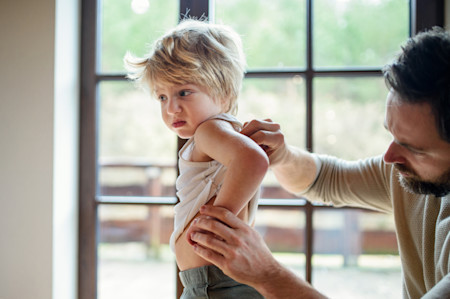Eczema treatment: Coal tar preparations
Use as recommended
Used for more than 100 years to treat eczema, coal tar is occasionally recommended to treat a child. If it’s recommended, be sure you know these facts, which include where to never apply it.

Why do dermatologists recommend coal tar for eczema?
Occasionally, a dermatologist recommends coal tar to treat a child’s eczema. Coal tar preparations come in many forms. You’ll see creams, gels, ointments, and solutions you can add to the bath.
A coal tar preparation can reduce:
Inflammation (redness, swelling, heat)
Itch
Thickened skin
Fewer dermatologists recommend for kids
For centuries, people have used coal tar to treat eczema and other skin conditions. Today, fewer dermatologists recommend this treatment for children. Too few clinical trials have studied it as a treatment for eczema.
Safety and effectiveness
We do not know whether coal tar provides safe and effective treatment for children. In general, coal tar is considered safe.
The U.S Food and Drug Administration (FDA) says that coal tar is a safe and effective drug ingredient in low concentrations.
When the amount of coal tar in a product falls between 0.5 and 5.0%, the FDA says the medicine can be sold without a prescription.
Is there a cancer risk?
There is no scientific evidence that coal tar causes cancer when the concentration ranges between 0.5 and 5.0%.
Some studies suggest that ingredients in coal tar can cause cancer when a person is exposed to very high concentrations, such as in roofing and road paving.
Further research is needed to know whether using coal tar on the skin can cause skin cancer.
How to use
Apply to the eczema (or add to the bath) as directed by your child’s dermatologist.
DO NOT USE near eyes, mouth, or skin folds.
If your child’s skin is really irritated, DO NOT use.
Keep your child out of the sun while the coal tar preparation is on the skin and for at least 2 hours after rinsing off the coal tar preparation.
Possible side effects
Tar-like smell (some products)
Messy
Stains clothing and light-colored hair
Breakouts that look like acne
Burning, stinging
Skin irritated
When to get medical help
Get immediate medical help if your child has signs of tar toxicity — urine looks tarry, vomiting, or nausea. This condition is rare. It can happen when a large amount of coal tar is applied to a child’s skin or a child drinks coal tar.
Get immediate medical help if your child has an allergic reaction:
Hives
Problems breathing
Swelling on face, lips, tongue, or throat
When should I call my child’s dermatologist?
Call the office if you treat your child’s skin with coal tar and notice any of the following:
Bumps that look like whiteheads or pimples.
Eczema gets worse.
Skin becomes more irritated.
Related AAD resources
Image
Getty Images
References Cosmetic Ingredient Review Expert Panel. “Final safety assessment of coal tar as used in cosmetics.” Int J Toxicol. 2008;27 Suppl 2:1-24.
Eichenfield LF, Tom WK, et al. “Part 2: Guidelines of care for the management and treatment of atopic dermatitis with topical therapies.” J Am Acad Dermatol. 2014 Jul;71(1):116-32.
Paghdal KV, Schwartz RA. “Topical tar: back to the future.” J Am Acad Dermatol. 2009 Aug;61(2):294-302.
 Atopic dermatitis: More FDA-approved treatments
Atopic dermatitis: More FDA-approved treatments
 Biosimilars: 14 FAQs
Biosimilars: 14 FAQs
 How to trim your nails
How to trim your nails
 Relieve uncontrollably itchy skin
Relieve uncontrollably itchy skin
 Fade dark spots
Fade dark spots
 Untreatable razor bumps or acne?
Untreatable razor bumps or acne?
 Tattoo removal
Tattoo removal
 Scar treatment
Scar treatment
 Free materials to help raise skin cancer awareness
Free materials to help raise skin cancer awareness
 Dermatologist-approved lesson plans, activities you can use
Dermatologist-approved lesson plans, activities you can use
 Find a Dermatologist
Find a Dermatologist
 What is a dermatologist?
What is a dermatologist?